Nylon removable dentures
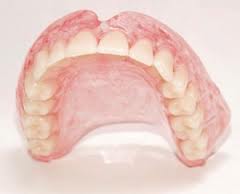
Today removable nylon dentures become a worthy replacement for toxic acrylic plastic prostheses.
Nylon is a new material that is used with great success in dentistry.
Dentures made of nylon are popularly called "soft", because they are quite flexible and flexible.
The physical properties of the nylon construction are comparable to those of a rigid nylon cap.
Fixation of a nylon prosthesis in the oral cavity is performed using clasps.
A removable nylon prosthesis is ideal for daily use.
With the help of such constructions, the restoration of missing teeth is carried out and there is no additional load on adjacent teeth.
If the patient has periodontal disease and mobile teeth, the use of a removable nylon prosthesis is an important aspect.
The nylon prosthesis includes a stable dye, and the scale of shades that give the color of the identity of the oral mucosa is quite wide.
In each case, an individual selection of the color of the structure is made.
Distinguish:
- Partial denture made of nylon. It is used to restore partial tooth loss.
- A full removable nylon prosthesis is used with full edentulousness.
- Single tooth design. In the absence of one tooth, a special microprosthesis is made.
Benefits
Among the advantages of nylon prostheses are the following:
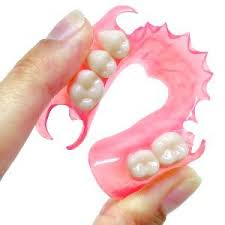
- There is no need to grind supporting teeth and cover them with crowns.
- Fixing of supporting teeth with the help of clasps is performed in the gingival region, which does not harm the aesthetics.
- Nylon is highly biocompatible and hypoallergenic, making it ideal for allergy sufferers. Does not contain substances toxic to the body.
- Preservation of color and shape of the structure with prolonged wear.
- The hygroscopicity of nylon provides resistance to the development of pathogenic flora, which can cause inflammatory diseases of the oral cavity and the appearance of halitosis.
- Uniform distribution of chewing load, lack of load on the remaining teeth.
- The presence of high aesthetics. Nylon prostheses are called “invisible prostheses”, which is associated with the absence of metal elements in the smile zone.
- Lightweight construction.
- Convenience in the care of the prosthesis.
- No likelihood of deformation or structural failure.
- Duration of operation.
- The absence of abrasion and irritation of the oral mucosa.
- Strength and flexibility of the prosthesis. Due to the high elasticity of the structure, getting used to it is much faster than to other removable dentures.
- Nylon structures, due to the peculiarities of their manufacture, have an accurate fit in the oral cavity and stable fixation.
disadvantages
Nylon dentures are not without flaws.
Cons of nylon structures:
- Dentures are not repairable.
- Hygienic care is more complicated than for other types of removable structures. A toothbrush with toothpaste can leave roughness and scratches on the surface of the prosthesis, which can lead to the penetration of pigments.
- Cleaning of the structure should be carried out using special means designed to care for nylon prostheses.
- Uneven load distribution during chewing.
- The development of bone atrophy in the place of missing teeth.
- Poor chewing of solid food.
- Regular correction of the structure is required in connection with its subsidence.
- When using prostheses, patients have to abandon the use of products that have a bright color, high acidity, hot dishes, alcohol with a strength of more than 40% alcohol content, as well as smoking.
- High flexibility and elasticity of the structure over time leads to "rubbing" of the mucous membrane of the oral cavity.
- A relatively high cost of the prosthesis, compared with other types of removable structures.
Indications
The installation of a nylon prosthesis is indicated in the following cases:
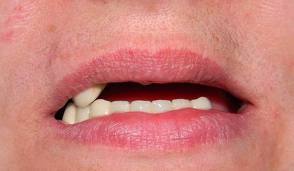
- Lack of one or more teeth.
- Full adentia.
- The presence of allergies to acrylic plastic, metal, vinyl, latex.
- Prosthetic stomatitis, which may be a reaction to acrylic.
- To improve aesthetics.
Contraindications
The installation of nylon prostheses is contraindicated in:
- The presence of a high degree of atrophic changes in bone tissue.
- High compliance (mobility) of the mucous membrane of the gums.
- Tooth mobility, periodontal disease and periodontitis.
- The insufficient height of the remaining teeth.
One-tooth prosthesis made of nylon
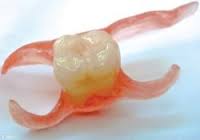
It is used if the patient has only one tooth, if he does not want to grind the supporting teeth under the installation of a bridge or implant. In this case, the use of a "microprosthesis" can be an excellent alternative. The installation of the prosthesis on 1 tooth is possible in the presence of supporting teeth.
End defect prosthetics
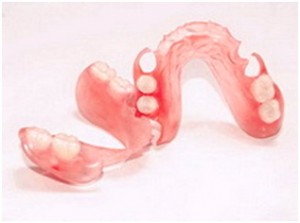
Very often there are cases of the presence of terminal defects of the teeth (absence of teeth at the end of the dentition). In this situation, the difficulty of installing a removable prosthesis is the lack of a second abutment. In this regard, locks are used.
A metal-ceramic crown is put on the tooth closest to the structure and one part of the lock fastening is located on it. The other part of the lock is mounted in a nylon prosthesis. When fixing the structure in the mouth, the lock snaps and holds the prosthesis securely even while chewing food.
What's better
Removable dentures: nylon and acrylic
| Nylon prosthesis | Acrylic denture | |
| Construction basis | Nylon | From acrylic plastic |
| Clammer | From nylon | Metal |
| Plastic | Soft, flexible, light | Less ductile |
| Possibility of breakage | Is absent | High enough |
| Aesthetics | The shape and color are quite natural, the teeth shine through the base | Not aesthetically pleasing, metal clasps are visible when talking |
| Preservation of appearance | Throughout the period of application | Throughout the period of use |
| Surface | Smooth | Porous, as a result, bacteria can multiply and lead to inflammatory diseases and the formation of an unpleasant odor. |
| Toxicity | Not toxic, do not absorb moisture, do not emit odors | The composition contains free methyl ester of methacrylic acid. It is toxic and gradually stands out when it enters the body. |
| Allergy | Hypoallergenic | May cause an allergic reaction |
| Fixation | It is fixed by suctioning the structure to the gums and natural protrusions of the jaws | The principle of attachment is the same. Mounting on mini-implants is possible. |
| Cost | Expensive | Cheaper than Nylon |
Cost
Removable nylon dentures, the prices of which are quite high, are made abroad.
The cost of the construction usually includes: the work of the dentist, dental technician and other specialists. Compared to acrylic designs, the cost of flexible nylon prostheses is more expensive. For example, installing a removable denture made of acrylic costs approximately 15000 rubles, and nylon - 18000 rubles.
| Type of nylon prosthesis | Price, rub.) |
| Complete denture | 25000 |
| Partial denture | 20000 |
| Prosthesis for up to three teeth | 15000 — 18000 |